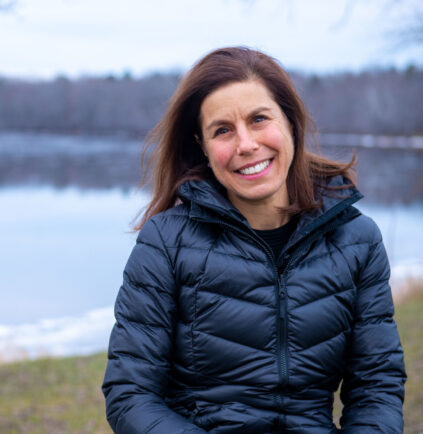Jessica Jansujwicz
Research Interests
- Human dimensions of natural resources
- Community-based conservation
- Stakeholder engagement
- Collaborative natural resource management
- Participatory decision-making
Research Projects:
- The Landowner Networking Project: Supporting community-based vernal pool conservation on private land
- Integrating and Sharing Data to Support Resilience in Coastal Maine Communities
- The Future of Dams (NEST)
- Renewable Energy from the Tides
Resources:
- Mitchell Center feature, January 2022
‘Disciplinary Nomad’: Jessica Jansujwicz finds her place as researcher, teacher, mentor, leader - Mitchell Center Talk, September 23, 2019 (Link to video)
We have the plan, now what? Supporting implementation of community-based vernal pool conservation on private lands - Bangor Daily News Article, March 23, 2019
It’s now spring. Here’s what to do when you see water pools emerge in your yard. - Mitchell Center News, December 5, 2018
Making Science Useful for Decision Makers - Vernal Pools Website – Of Pools and People
- Mitchell Center News, October 23, 2018
Stakeholder Workshop Focuses on Tidal Power - Interdisciplinary Panel Discussion, November 6, 2017
A Conversation About Decision Support Tools (Link to video) - Mitchell Center News, July 14, 2014
Scholarly Article: Vernal Pools Conservation Calls for Diverse Perspectives
Degrees
- Ph.D. Ecology and Environmental Sciences, University of Maine, Orono
- M.S. Wildlife & Fisheries Conservation, University of Massachusetts, Amherst
- B.A. Zoology with honors, Connecticut College, New London
Profile:
As an applied social scientist with a focus on the human dimensions of natural resources, Jessica works at the interface between science and policy. Her scholarship and research is driven by concern for the gap between scientific knowledge production and effective conservation action. Broadly, Jessica’s research focuses on the connection between humans and natural resources and aims to integrate stakeholder values, concerns, and information needs into policy development, conservation planning, scientific research, and program design and implementation. More specifically, she is interested in participatory approaches to policy-making and science with an emphasis on collaboration, citizen science, and interdisciplinary, stakeholder-driven research. Past and current research topics include regulatory and community-based approaches to vernal pool conservation, sustainable development of tidal power, and trade-offs in decision-making regarding the future of dams in New England.
Selected Publications
Jansujwicz, J. S., Calhoun, A. J., Bieluch, K. H., McGreavy, B., Silka, L., & Sponarski, C. (2020). Localism “Reimagined”: Building a Robust Localist Paradigm for Overcoming Emerging Conservation Challenges. Environmental Management, 1-18.
Vogel, S. K., Jansujwicz, J. S., Sponarski, C. C., & Zydlewski, J. D. (2020). Science in action or science inaction? Evaluating the implementation of” best available science” in hydropower relicensing. Energy Policy, 143, 111457.
Roy, S. G., Uchida, E., de Souza, S. P., Blachly, B., Fox, E., Gardner, K., Gold, A., Jansujwicz, J., Klein, S., McGreavy, B., Mo, W., Smith, S., Vogler, E., Wilson, K., Zydlewski, J., Hart, D. (2018). A multiscale approach to balance trade-offs among dam infrastructure, river restoration, and cost. Proceedings of the National Academy of Sciences, 115(47), 12069-12074.
Roy, S. G., Uchida, E., de Souza, S. P., Blachly, B., Fox, E., Gardner, K., Gold, A., Jansujwicz, J., Klein, S., McGreavy, B., Mo, W., Smith, S., Vogler, E., Wilson, K., Zydlewski, J., Hart, D. (2018). Open models for dammed rivers: A New England case study for balancing social-ecological sustainability of riverine ecosystem services.
Jansujwicz, J.S. and AJK Calhoun. (2017). Community-based strategies for strengthening science and influencing policy: vernal pool initiatives in Maine. Maine Policy Review 26 (2): 33-42.
McGreavy, B., A. J. K. Calhoun, J. Jansujwicz, and V. Levesque. (2016). Citizen science and natural resource governance: program design for vernal pool policy innovation. Ecology and Society 21(2):48. http://dx.doi.org/10.5751/ES-08437-210248.
Johnson, T. R., Jansujwicz, J. S., & Zydlewski, G. (2015). Tidal power development in Maine: stakeholder identification and perceptions of engagement. Estuaries and coasts, 38(1), 266-278.
Jansujwicz, J. S., & Johnson, T. R. (2015). Understanding and informing permitting decisions for tidal energy development using an adaptive management framework. Estuaries and coasts, 38(1), 253-265.
Jansujwicz, J. S., & Johnson, T. R. (2015). The Maine Tidal Power Initiative: transdisciplinary sustainability science research for the responsible development of tidal power. Sustainability Science, 10(1), 75-86.
Gardner, S. K., Jansujwicz, J. S., Hutchins, K., Cline, B., & Levesque, V. (2014). Socialization to interdisciplinarity: Faculty and student perspectives. Higher Education, 67(3), 255-271.
Jansujwicz, J. S., & Johnson, T. R. (2014). Human dimensions research on marine hydrokinetic energy development in Maine. In Proceedings of the 2nd international conference on environmental interactions of marine renewable energy technologies.
Calhoun, A.J.K., J.S. Jansujwicz, M.L. Hunter, and K.P. Bell. (2014). Improving management of small natural features on private lands by negotiating the science-policy boundary for Maine vernal pools Proceedings of the National Academy of Sciences, 111(30), 11002-11006. DOI: 10.1073.
Jansujwicz, J.S., A.J. K. Calhoun, J.E. Leahy, and R.J. Lilieholm. (2013). Using mixed methods to develop a frame-based private landowner typology Society & Natural Resources: An International Journal 26(8): 945-961 DOI:10.1080/08941920.2012.729294.
Jansujwicz, J.S., A.J.K. Calhoun, and R.J. Lilieholm. (2013). The Maine Vernal Pool Mapping and Assessment Program: Engaging municipal officials and private landowners in community-based citizen science. Environmental Management 52(6): 1369-1385 DOI 10.1007/s00267-013-0168-8.
Gardner, S.K., J.S. Jansujwicz, K. Hutchins, B. Cline, and V. Levesque. (2013). Socialization to interdisciplinarity: faculty and student perspectives. Higher Education 67(3): 255-271 DOI: 10.1007/s10734-013-9648-2.
Gardner, S.K., J. Jansujwicz, K. Hutchins, B. Cline, V. Levesque. (2012). Interdisciplinary doctoral student socialization International Journal of Doctoral Studies 7: 377-394.
Jansujwicz, J.S. and A.J.K. Calhoun. (2010). Protecting natural resources on private lands: The role of collaboration in land-use planning. In Trombulak, S., and R. Baldwin, eds. Landscape-scale Conservation Planning. New York, NY: Springer-Verlag, pp. 205-233.

